#private guides lisbon
Explore tagged Tumblr posts
Text
5 Best Premium Experiences In Lisbon - Holiday Senses
Book your Lisbon holidays with Holiday Senses and discover premium experiences in Lisbon. Join a Premium Tour or Activity with your Group or create one and wait for others to join! We guarantee you will enjoy a lot of fun and some special moments with unforgettable memories!
0 notes
Text
Enjoy this one
I'm starting a history tour, standing there for fifteen minutes with a group of fourteen people talking about the lisbon earthquake. For fifteen minutes I'm going into detail about how and when the earthquake happened, the details etc, then the reconstruction of lisbon and the changes it brought, and all the while there's this dude that's just standing there. When I'm done this dude turns to me and asks "is this the food tour?"
I'm dead ass, are you for real now?
Meanwhile I'd noticed my coworker across the street having a smoke. It's 15 minutes before the start of the food tour so I tell this guy, listen the food tour starts in fifteen minutes and this is the meeting point, I can see my coworker over there you just wait here and he'll be here in a second.
Not two minutes later my coworker sends a text saying this guy went RUNNING to him asking when does the food tour start.
You'd think, there's no chance there's TWO people who are that fucking stupid but no. TODAY I'm doing a private tour with a couple. AGAIN I AM TALKING ABOUT THE EARTHQUAKE OF LISBON. Standing there going at it in detail. The same coworker is standing far away from me and some dude interrupts me and goes "is this the food tour?"
SIR. DOES THE EARTHQUAKE OF LISBON SOUND LIKE A FOOD TOUR? NO
do none of you know to follow instructions? Just because the ticket you bought says the guide is wearing a blue bag it doesn't mean it's ANY guide with a blue bag!!!!!!!
7 notes
·
View notes
Text
How to Enjoy Luxury Travel in Portugal
Portugal, with its stunning landscapes, rich history, and vibrant culture, is an ideal destination for luxury travel. From the rolling vineyards of the Douro Valley to the pristine beaches of the Algarve, Portugal offers a range of experiences that cater to those seeking the finer things in life. Here's how you can indulge in luxury travel in Portugal and make the most of this beautiful country.

Stay in Exquisite Accommodations
Five-Star Hotels and Resorts
Portugal boasts an impressive selection of five-star hotels and resorts that promise opulent comfort and world-class service. In Lisbon, you can find luxury establishments like the Four Seasons Hotel Ritz and the Bairro Alto Hotel, both offering unparalleled amenities and breathtaking views of the city. In the Algarve, resorts such as Vila Vita Parc and Conrad Algarve provide serene retreats with stunning ocean vistas and top-notch facilities.
Historic Palaces and Boutique Hotels
For a unique and luxurious experience, consider staying in a historic palace or a boutique hotel. The Pestana Palace in Lisbon, a 19th-century palace turned hotel, offers a regal experience with its lavish decor and lush gardens. In Porto, the Yeatman Hotel, located in the heart of the historic wine cellars, provides a blend of luxury and tradition with its wine-themed design and Michelin-starred dining.
Savor Gourmet Dining
Michelin-Starred Restaurants
Portugal is home to several Michelin-starred restaurants that offer exquisite dining experiences. In Lisbon, Alma and Belcanto, both with two Michelin stars, serve innovative dishes that showcase the best of Portuguese cuisine. In the Algarve, restaurants like Ocean and Vila Joya provide gourmet dining with stunning coastal views.
Wine Tasting in the Douro Valley
No luxury trip to Portugal is complete without a visit to the Douro Valley, one of the world's oldest wine regions. Enjoy private tours and tastings at prestigious vineyards such as Quinta do Crasto and Quinta do Vallado. Stay in luxury wine estates like Six Senses Douro Valley, where you can relax in elegant surroundings while savouring exceptional wines.
Explore in Style
Private Yacht Charters
Discover Portugal's stunning coastline with a private yacht charter. Sail along the Algarve's golden beaches or explore the hidden coves of the Azores. Private charters offer bespoke itineraries, allowing you to experience the beauty of Portugal's waters in complete privacy and luxury.
Exclusive Guided Tours
Enhance your travel experience with exclusive guided tours. In Lisbon, take a private tram tour through the city's historic neighbourhoods or enjoy a personalized walking tour of Porto's UNESCO-listed Ribeira district. For a truly unique experience, consider a private helicopter tour over the stunning landscapes of Sintra and Cascais.

Pamper Yourself
Luxury Spas and Wellness Retreats
Indulge in relaxation at Portugal's top luxury spas and wellness retreats. The Vila Vita Parc in the Algarve offers a world-class spa with treatments to rejuvenate and refresh. The Monverde Wine Experience Hotel in the Vinho Verde region combines wellness with wine, offering unique vinotherapy treatments in a tranquil setting.
Luxury travel in Portugal with Europa Word Travels promises an unforgettable experience filled with elegance, comfort, and exceptional service. By staying in exquisite accommodations, savouring gourmet dining, exploring in style, and indulging in pampering experiences, you can enjoy the best that Portugal has to offer. Call them at +34 91 139 32 77 to plan your tour.
We’d love to connect with you on social media, and are active on Facebook and Instagram
#How to Enjoy Luxury Travel in Portugal#Luxury Travel Portugal#Travel Portugal#Luxury Travel in Portugal
2 notes
·
View notes
Text
Portugal Princesas
Friday night in Lisbon began with us dragging our suitcases up a 3-story walk to the Airbnb we were sharing that night with our Kiwi friends! None of them were at the place so Irene and I walked 3 mins to Fumeiro de Santa Catarina restaurant which was relatively empty but were told to come back in 20 mins. In the meantime we hiked up to Miradouro de Santa Catarina and had a drink outside overlooking the water. Irene and I had a lovely romantic dinner, topped off with our first port of the trip.
When I looked at Find my Friends, I noticed that my friend Shiri was in Lisbon too??? At first, I thought it was a glitch but she quickly confirmed that she and her partner Leron were both currently traveling in Portugal. We arranged to meet up with them, Aidan, and Georgia for drinks near Pink Street. We had a great time catching up with everyone.
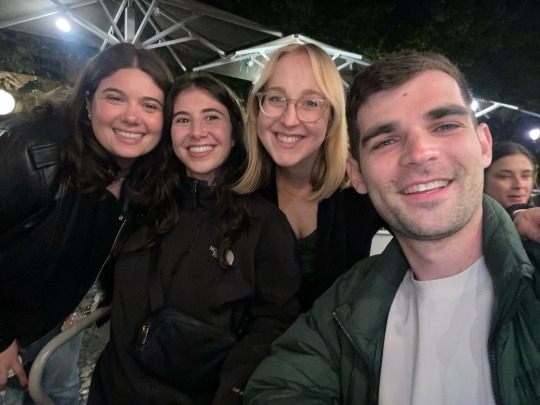
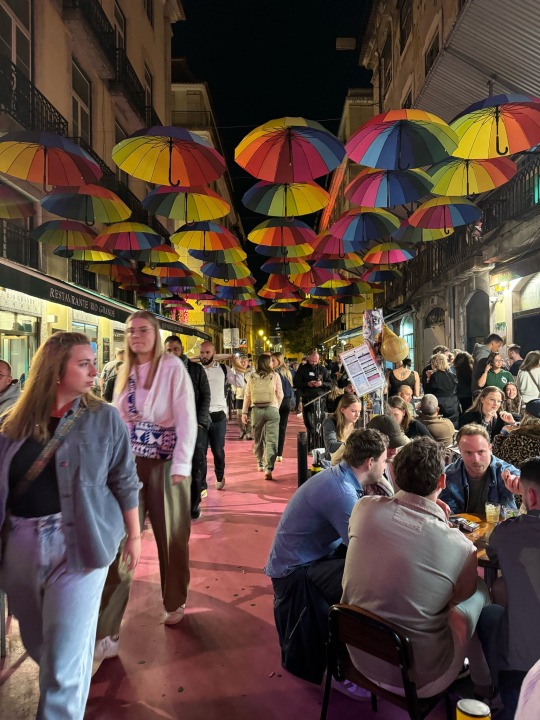
In the morning, Irene, the Kiwis, and I departed for what was meant to be a 3 hr private walking tour. In just under 4 hours our guide showed us what felt like all of Lisbon. We learned about the history and culture with a few photo-ops in between.
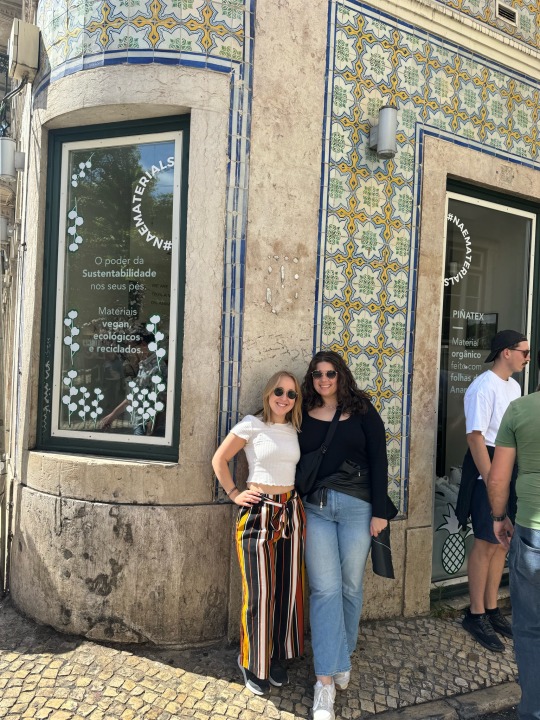
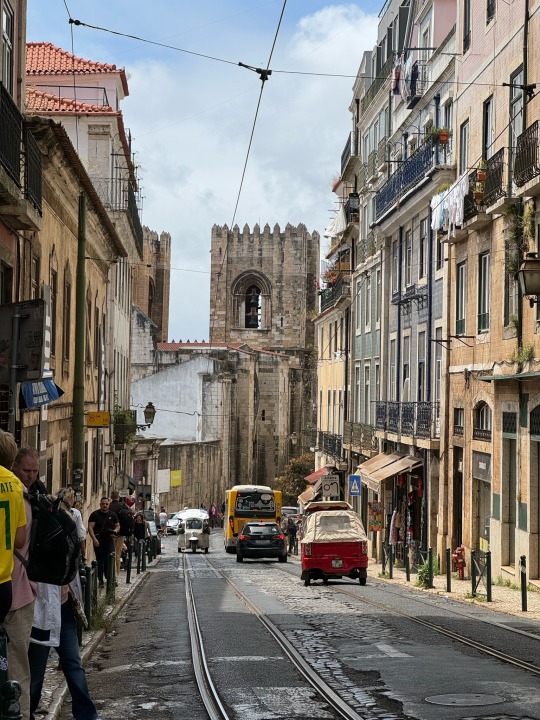
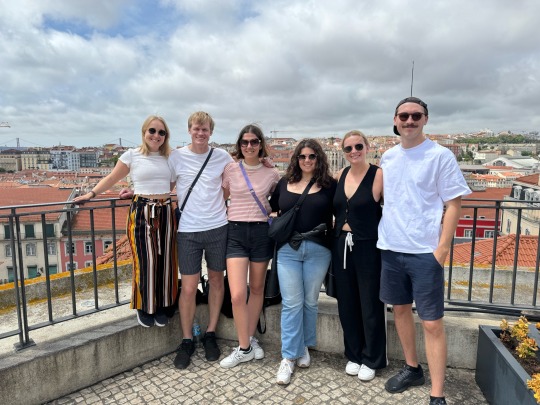
Straight after, Irene and I had to check in to our hotel to get ready for our sunset cruise with the wedding crew. For those of you that don’t know, the whole reason for this trip was that my colleague, Shannon, was getting married in Lisbon! The cruise started off windy but ended nice and calm.
After the cruise we met up with the Kiwis again for our 9:30 PM dinner rez @ Água Pela Barba. There we ate allllll the tapas and chatted until they started closing up at midnight. What a Portuguese night we had! Afterwards, the Kiwis did not let us go home and instead brought us to their new fav pub/club called Karmasutra where we played Irene’s favorite pub game, fingers.
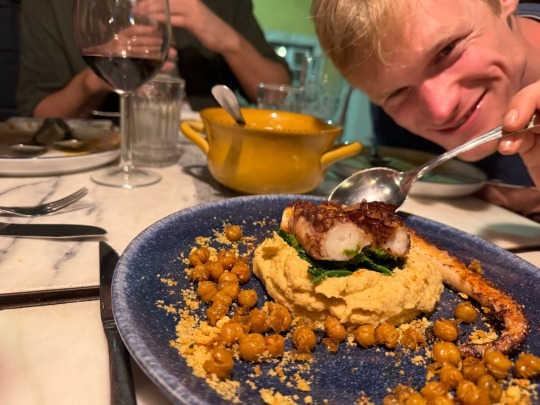
Irene had the brilliant idea to get our hair done before the wedding so on Sunday morning we got done up for under $30 each! You tell us if you think it was worth it.
We had fun getting ready together and did a photo shoot while we were waiting for the bus. We made it to the venue, Forte da Cruz, just before the ceremony began, and right after the rain stopped. It was a beautiful and personal ceremony, led by one of their friends.
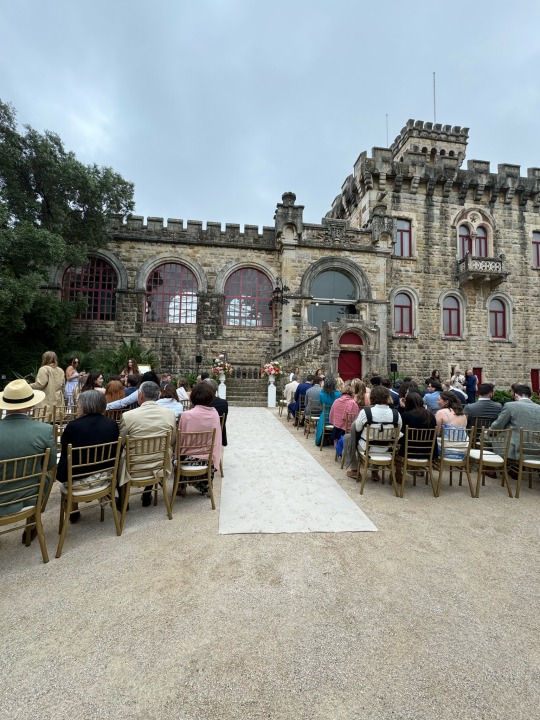
This venue was incredible - a literal castle overlooking the water. For cocktail hour, there was a saxophonist, great views, and impeccable vibes. The reception was filled with funny speeches and plenty of wine. Afterwards, the dance floor opened up and was packed with people dancing, including us. They played all the hits of our generation. We had a blast and were sad to go.
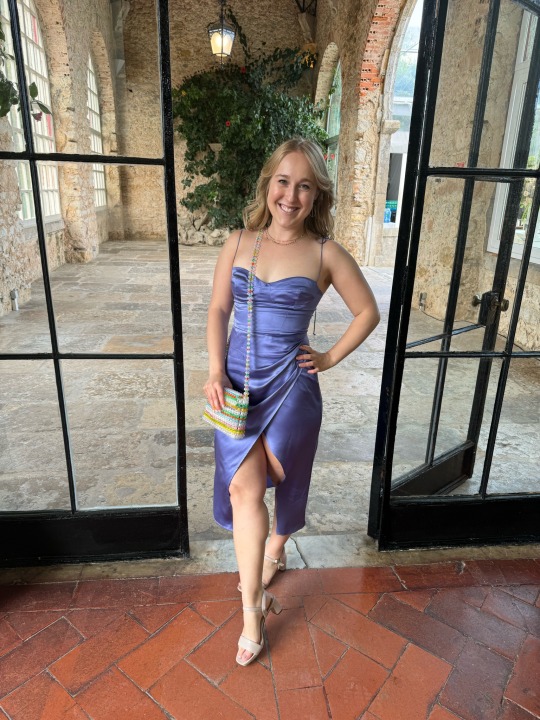
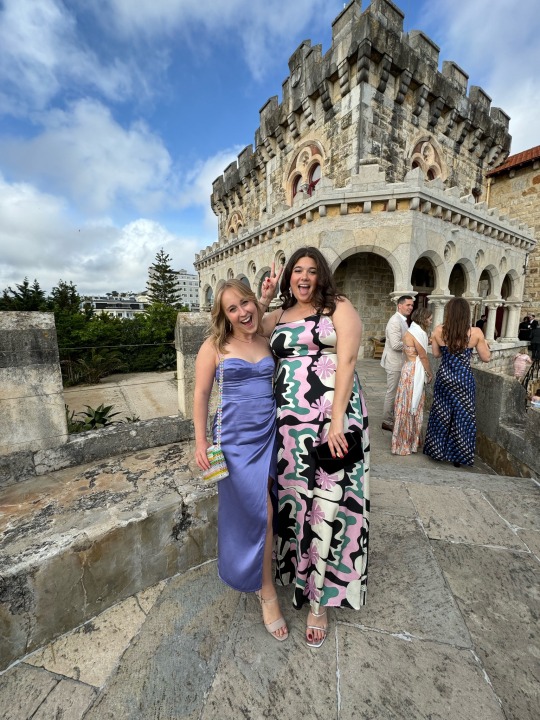
The next morning Irene and I began the long journey home. We watched a few movies together on the plane, both wedding related, and made matching Lagos phone backgrounds. At Dulles we parted ways and eventually both made it home.
2 notes
·
View notes
Photo









Nazaré & Óbidos private day tour with Dianne & family from US! 5 Stars via Airbnb Reviews: “We spent the day visiting Nazaré and Óbidos. We wanted to see the waves and that was quite the site to see. We learned a lot about the surfing world. We had a great seafood lunch, just let Antonio pick the seafood. It was all delicious. In the way back to Lisbon we stopped at Óbidos for a walk along the castle wall - great views - and sampled the local cherry liqueur. It was great to just have Antonio be the tour guide because you see the things you might miss or just not find in a tour book. It was me, spouse, and adult son. We all enjoyed it.” Join us ride351.com/activities.php
7 notes
·
View notes
Text
Portugal Luxury Real Estate: A Guide to Investing in Elegance
Portugal has emerged as one of the top destinations for luxury real estate in Europe. With its stunning coastline, mild climate, and vibrant culture, the country attracts high-net-worth individuals seeking premium properties. Whether you're drawn to historic estates, sleek modern villas, or exclusive penthouse apartments, Portugal Luxury Real Estate market offers unparalleled options. Let’s explore what makes this market so attractive and where to find the best investment opportunities.
Why Invest in Portugal Luxury Real Estate?
Portugal’s luxury real estate market has gained global recognition due to:
Golden Visa Program: Attracting international buyers with residency benefits.
Economic Stability: A thriving economy and consistent property value growth.
Desirable Lifestyle: Renowned for its gastronomy, safety, and scenic beauty.
High Rental Demand: Ideal for those looking to generate income from vacation rentals or long-term leases.

Prime Locations for Luxury Properties
Portugal’s diverse regions cater to various tastes and lifestyles, offering unique luxury real estate options.
Lisbon
The capital city combines old-world charm with modern sophistication. Key areas include:
Chiado and Baixa: Known for historic buildings and high-end apartments.
Avenidas Novas: A hub for sleek, modern residences. Lisbon attracts investors seeking cosmopolitan living and a vibrant cultural scene.
Algarve
Famous for its golden beaches and golf resorts, the Algarve is a hotspot for luxury properties. Highlights include:
Vilamoura: Renowned for its marina and exclusive villas.
Lagos and Albufeira: Popular for their scenic coastlines and upscale developments. The Algarve is ideal for buyers looking for holiday homes or rental investments.
Cascais
This affluent suburb near Lisbon offers a mix of coastal charm and exclusivity. Features include:
Oceanfront Estates: Breathtaking views and direct beach access.
High-End Communities: Secure gated developments with world-class amenities. Cascais appeals to families, retirees, and those seeking a peaceful yet luxurious lifestyle.
Porto
Porto, a UNESCO World Heritage city, offers a blend of history and modernity. Key areas include:
Ribeira: Waterfront apartments with historic appeal.
Foz do Douro: Coastal villas and luxury homes with stunning views. Porto is perfect for buyers seeking a cultural experience and strong rental potential.
Key Features of Portugal’s Luxury Homes
Luxury properties in Portugal boast exceptional features, such as:
Prime Locations: Oceanfront views, historic settings, or urban centers.
High-Quality Construction: Premium materials and innovative designs.
Exclusive Amenities: Infinity pools, private gyms, and landscaped gardens.
Sustainability: Many new developments focus on eco-friendly designs.
Benefits of Investing in Portugal
Investing in Portugal’s luxury real estate offers:
Attractive Tax Benefits: Favorable conditions under the Non-Habitual Residency (NHR) scheme.
Golden Visa Eligibility: For properties meeting investment thresholds.
Cultural Richness: A lifestyle enriched by Portugal’s traditions and modern amenities.
Market Growth: A robust property market with potential for value appreciation.
Conclusion
Portugal’s luxury real estate market combines elegance, value, and lifestyle, making it a top choice for discerning buyers. From the vibrant streets of Lisbon to the serene beaches of the Algarve, the options are endless for those seeking an investment or a dream home.
At Portugal Investment Properties, we specialize in finding exclusive luxury properties tailored to your preferences. Contact us today to explore the finest real estate opportunities Portugal has to offer.
0 notes
Text
Planning a Unique Corporate Retreat in Europe: Tips and Insights
Corporate retreats are no longer just an excuse to escape the office; they have evolved into an opportunity to build team cohesion, inspire creativity, and foster innovative thinking. Europe, with its stunning landscapes, rich cultural heritage, and world-class facilities, offers countless options for organizing a unique and impactful corporate retreat. By exploring tailored corporate retreats packages, you can simplify planning while ensuring an experience that meets your team’s goals. Whether you’re planning to brainstorm in the Alps, rejuvenate by the Mediterranean, or strategize in a historic castle, here’s a guide packed with tips and insights to make your European corporate retreat unforgettable.
1. Define Your Goals and Objectives
Before deciding on the location or activities, clarify the purpose of your retreat. Is it to reward your employees, enhance team bonding, develop leadership skills, or brainstorm new ideas? Clear goals help determine the ideal destination, itinerary, and budget. For example:
For team bonding: Consider activities like vineyard tours in Bordeaux or hiking in the Scottish Highlands.
For innovation and brainstorming: Choose creative hubs like Amsterdam or Berlin, known for their inspiring environments.
2. Choose the Perfect Location
Europe’s diversity allows for a variety of retreat settings. Here are some standout options:
Urban Retreats: Cities like Barcelona, Prague, or Vienna offer a mix of history, culture, and modern amenities. They’re perfect for companies looking to combine business with leisure activities.
Nature Escapes: Retreats in the Swiss Alps or Tuscany’s countryside offer a serene environment to unplug and refocus.
Unique Venues: Consider booking a castle in Ireland, a chalet in the French Alps, or a villa on the Amalfi Coast for an extraordinary experience.
3. Timing is Everything
When planning a retreat in Europe, timing plays a crucial role. The peak summer season (June to August) sees an influx of tourists, which might affect pricing and availability. Consider the shoulder seasons (spring and autumn) for fewer crowds, mild weather, and lower costs. For a cozy winter retreat, December offers the added charm of Christmas markets across Europe.
4. Incorporate Local Experiences
One of the greatest advantages of hosting a corporate retreat in Europe is the opportunity to immerse your team in local culture. Tailor your itinerary to include unique regional activities:
France: Host a cooking class in Provence or a wine-tasting session in Burgundy.
Italy: Organize a Vespa tour through the streets of Rome or a pasta-making workshop in Florence.
Norway: Embark on a team-building adventure with a Northern Lights excursion or fjord kayaking.
5. Choose Accommodations Wisely
Accommodations can make or break your retreat. Look for venues that offer both comfort and functional spaces for workshops or meetings. Many European destinations have venues specifically designed for corporate groups, combining luxury amenities with high-tech facilities. Whether it’s a boutique hotel in Lisbon or a resort in the Dolomites, ensure the venue aligns with your retreat’s objectives.
6. Plan for Accessibility and Logistics
Europe boasts a well-connected transportation network, making it relatively easy to travel between countries. When selecting a retreat destination, prioritize accessibility for your team:
Choose locations with direct flights or minimal transfers.
If your team is spread across multiple cities, pick a central location like Paris or Munich for convenience.
Arrange group transportation like private shuttles or trains to ensure smooth logistics.
7. Balance Work and Leisure
A successful corporate retreat strikes the right balance between structured activities and downtime. Overloading the schedule with meetings and workshops can lead to burnout. Incorporate leisure activities that allow team members to relax and bond, such as sightseeing tours, yoga sessions, or casual dinners at local restaurants.
8. Hire Local Experts
Partnering with local event planners or retreat organizers can significantly enhance your retreat experience. They bring insider knowledge, from securing unique venues to curating authentic activities. Local experts can also help navigate language barriers, cultural nuances, and permit requirements.
9. Embrace Sustainability
As sustainability becomes a priority for businesses, consider organizing an eco-friendly retreat. Opt for venues with green certifications, support local businesses, and minimize waste by avoiding single-use plastics. You can also include environmentally friendly team activities, such as tree planting or beach clean-ups, to leave a positive impact.
10. Evaluate and Reflect
Once the retreat concludes, collect feedback from participants to evaluate its success and identify areas for improvement. Use surveys or informal discussions to understand what worked well and how the retreat contributed to the team’s goals.
Sample Itinerary for a Corporate Retreat in Europe
Day 1: Arrival and Welcome
Arrive at the destination and check into the retreat venue.
Welcome lunch with local delicacies.
Icebreaker activities to set a collaborative tone.
Day 2: Workshops and Exploration
Morning workshop or brainstorming session.
Afternoon guided city tour or nature hike.
Evening team dinner at a traditional restaurant.
Day 3: Team-Building Activities
Morning team-building exercise, such as a cooking class or outdoor challenge.
Free time for personal exploration or relaxation.
Closing ceremony with awards or acknowledgments.
Day 4: Departure
Farewell breakfast.
Depart for home, rejuvenated and motivated.
Final Thoughts
Planning a corporate retreat in Europe requires careful thought, but the rewards are immense. By selecting a destination that aligns with your company’s goals, incorporating unique local experiences, and prioritizing logistics, you can create an unforgettable retreat that boosts team morale and drives business success. So pack your bags, gather your team, and let Europe inspire your next big idea.
#wellness journey#wellness retreats#wellness travel#corporatehealth#corporate retreat#corporate wellness programs
0 notes
Text
Sunday September 1, 2024
We set an alarm to get up and showered and have eaten breakfast before meeting our guide, Felipa, for a private overview tour of Lisbon. She drove us all around in a large van, quite adeptly! Sunday morning was quiet and a good time to be out exploring the city.
We learned a lot, but were still a bit jet lagged, so of course now I can think of many more questions I wish I’d asked!
Bronze Age archeological findings dates the first civilization to Roman 1BC to 1AD. In the 700s Moorish from the north coast of Africa came here (it’s actually not far at all). In 1147, the first king of Portugal was named, and it was a monarchy / dictatorship until a revolution in 1974.
Everyone that talks history of Lisbon mentions the earthquake of 1755. Because of that, many of the buildings are uniform and “modern,” by European standards.
Lisbon is a city of seven hills and distinct neighborhoods, which we explored this morning. Some are Bario Alta - high neighborhood where our hotel is, Róseo square, Alfama near the river, Grassa, Our Lady of the Hill, and Belem where we spent a lot of time. The Portuguese explorers launched from Belém, and there is a cool Tower which defended the port and Jerónimos Monastery from the 1500s - a gorgeous building.
We stood in line at Pasteis de Belem - the keepers of the original recipe for Pastel de Nata since 1837 when the monastery closed. The Experience reminded us of Cafe du Monde in New Orleans! It was great and now that we’ve had three Pasteis, we agree that the original is the best.
From there, we drove back along the river, then up the hill a different way. We stopped by the Parliament building, and she talked with us a bit about their government and their side from being in the EU. Then she dropped us back at the hotel before 2pm, and we desperately needed naps by then!
We rested, and by 5 pm we were back on the street, walking through some different areas that we’d seen from the van, the Chiada shopping area and the Comos Convent. We shopped a bit, then headed across town to Restaurante Bonjardim, also recommended by Felipa where we enjoyed Roasted chicken with peri peri sauce and a bottle of local white wine.
We walked back down a street with wide boulevards and trees, felt like Paris. There was a DJ spinning tunes, and couples dancing a mix of salsa/swing that was fun to watch. The joy in the air was palpable!
From there, we cut up the hill through neighborhoods, enjoying watching families in the little parks and cafes enjoying a beautiful Sunday evening. Felipa said for many it was a last day of a long holiday, and people would be trying to enjoy every last minute, and that seemed to be the case!
From our hotel, we’d been overlooking this two story house with a crane coming out of the roof, and we were on a mission to find the house from the street! We did, and it didn’t look like anything special, so the mystery remains!
Back to the hotel, we sat on the patio and drank bourbon and Jeff had a gelato. Gorgeous relaxing evening!
0 notes
Text
Discovering Your Ideal Co-Living Space- A Guide for Digital Nomads
In the ever-evolving landscape of modern work, digital nomads traverse the globe, turning each destination into a temporary workspace. The allure of changing sceneries can be enchanting, yet the longing for community remains a steadfast companion. For those who seek both adventure and connection, co-living spaces and digital nomad retreats offer a sanctuary. At DigitalSpellCraft, we understand the unique blend of flexibility and fellowship these spaces provide. Here, we explore havens that not only inspire your digital pursuits but also nurture a sense of belonging.
1. The Collective Serenity: Outskirts of Ubud, Bali
Nestled amidst lush rice paddies and steeped in tranquility, this retreat in Ubud is more than just a place to stay; it’s a journey into mindfulness. The environment is tailored to foster deep connections, both with fellow nomads and one’s inner self. Daily yoga sessions, communal organic meals, and open-air co-working spaces create a harmonious balance between work, wellness, and social interaction. The soft sounds of nature and the gentle hues of green and earth tones provide a sensory-friendly backdrop that appeals to those who cherish peace and creativity.
2. Urban Oasis: The Heart of Berlin
In the vibrant core of Berlin, this modern co-living space embodies the dynamic spirit of its city. Designed for thinkers, creators, and innovators, the community thrives on the exchange of ideas and cultural fusion. The facility boasts thematic networking events, collaborative workshops, and a robust support system for professional growth. The use of bold, energizing colors within the living spaces sparks creativity, while quiet nooks allow for introspection and productivity.
3. Coastal Haven: The Shores of Lisbon
On the sunlit coasts of Lisbon, this retreat offers a serene escape with panoramic views of the Atlantic Ocean. It’s a perfect blend of work and leisure, where digital nomads can surf in the morning and brainstorm in the evening. The community here is built on the pillars of sustainability and local engagement, encouraging residents to connect with local culture and environmental initiatives. The design uses calming blues and sandy whites, creating a soothing palette that enhances focus and calm.
Choosing Your Community
When selecting a co-living space or retreat, consider what environment best aligns with your work rhythm and personal needs. Here are a few tips to guide you:
Community Events: Look for spaces that offer regular community gatherings, workshops, or social outings, which can enrich your experience and foster lasting relationships.
Privacy Options: Ensure there are private areas where you can unwind or focus deeply when needed, important for maintaining mental and emotional well-being.
Accessibility and Inclusivity: Check for facilities that are accessible and considerate of diverse needs, ensuring everyone feels welcome and supported.
Conclusion
In the quest for a nomadic lifestyle that embraces both freedom and fellowship, co-living spaces and digital nomad retreats stand out as beacons of community. They offer not just a desk or a bed, but a shared experience enriched with diverse cultures, shared goals, and mutual respect. As you journey through your digital nomad life, consider these spaces not just as places to live, but as opportunities to grow, connect, and thrive.
At DigitalSpellCraft, we celebrate the spirit of community and innovation that defines the digital nomad lifestyle. Explore these recommended spaces and find where your spirit feels most at home.
0 notes
Text
issuu
Best Private Tours In Lisbon Portugal - Holiday Senses
Find the top-rated and best-reviewed activities and tours in Lisbon, Portugal. For best Portugal personal experiences choose Holiday Senses, we guarantee you clean and safe tours, quality itinerary and we are always there for you. And also discover the secrets of Lisbon with fantastic Private Guided Tours or split the bill with a Premium Experience if you prefer. Visit our website today.
#tours in lisbon portugal#private luxury tours of portugal#best tours in lisbon#private guides lisbon#lisbon tour guides private#private tours in lisbon
0 notes
Text
Sunday, April 7 - Toledo










Toledo is full of tourists, and especially tour groups, and especially on a Sunday. Many of the tour groups are Chinese - the most groups we have seen so far in Spain. But there are also lots of school age groups and many, many private guides with just a few people. It became obvious that they got dropped off in Zocodover Square (easily accessible by larger busses), and then did a walk, mostly downhill, past the cathedral and over the Puente de San Martin (the second bridge photo, built in the late 14th century) and out to their waiting busses on another major road. As in Segovia, most of the streets in the old town can barely fit a compact car, let alone a bus.
We had done a bit of exploring last evening, and decided today to walk down and along the river (Rio Tajo - it becomes the Tagus in Portugal and empties into the Atlantic in Lisbon). The path was fairly busy with lots of locals, and as we neared a section where the city spills down to the river (most of the rest is a cliffy gorge), there were lots of folks fishing with elaborate set-ups unloaded from small carts. This is obviously the popular thing to do on a Sunday to escape the narrow streets and crowds of people. We understand completely, living in a tourist town.
We saw all sorts of birds, from tits to herons, ducks and wood pigeons, and even one black-headed gull. Most numerous, though, were pigeons and geese - so many geese. Most were white, although occasionally we could see a greylag, or an unfortunate mix of the two. They were making plenty of noise, and completely unfazed by all the human traffic.
Along the river, which makes a huge bend surrounding the city, were the remains of many low-head dams and mills. Some of the dams were broken up and runnable by water craft, but at least one was a stopper and dangerous. About halfway along the route was a ferry across to the other side of the gorge, where there were more hiking trails. Although we were there during "open" hours, it wasn't running - perhaps because of the recent high water. There was a log caught on the cable near the other side, so that needs to be moved before they can again begin operation.
Eventually we got to the "Roman Bridge", another pedestrian only bridge, shown in the first photo. It was originally built by the Romans as a three arch bridge, but it was rebuilt in the 10th century, when it lost one of the arches. Later the western tower was rebuilt in the 13th century and the eastern tower was reconstructed in 1721 in the Baroque style. As a result, it has a somewhat lopsided appearance. The geese don't seem to mind, though.
From here it was a long way up to the town, but Toledo has installed a set of covered escalators that make it fairly easy. We did walk up a ramp for a short distance before finding the middle of the string of escalators, but it saved a lot of stair steps and we were grateful as our cool morning had turned into a sunny and very warm afternoon.
Many of today's pictures are of some of the more interesting and bizarre things we noticed while wandering. A lot of the storefronts here have metal doors that have been painted with various scenes - it may be an effort to discourage tagging as we didn't see any of the painted ones that had been vandalized. The Christ with the hula hoop was outside a church and called "Resurrection". I think the statues on the cathedral were supposed to represent the Last Supper, but I was drawn to the one figure with his head on his hand, looking totally bored. Don Quixote was outside a hotel (not ours) - this is La Mancha country here. And I just liked all the beautiful wooden eaves stacked up above on one of the narrow streets.
We decided not to stay out in the crowded city in the late afternoon, but made our way to our rooftop terrace to enjoy the quiet and the views, and relax a bit. Tomorrow we head back to Madrid for two nights in an apartment before heading home.
0 notes
Text
Why Luxury Incoming Tours in Portugal & Morocco Should Be on Your Travel List
Exploring new countries is one of life’s greatest pleasures, and if you're seeking a unique and unforgettable experience, luxury incoming tours in Portugal and Morocco should be at the top of your travel list. These two vibrant and culturally rich destinations offer a perfect blend of history, natural beauty, and modern luxury. Whether you’re intrigued by Portugal’s stunning coastline or Morocco’s exotic landscapes and markets, opting for a luxury tour ensures you get the most out of your journey. Here’s why luxury incoming tours in Portugal & Morocco are a must for your next getaway.

Exclusive Access to Iconic Destinations
One of the biggest perks of luxury incoming tours is exclusive access to some of the most iconic and often private destinations in Portugal and Morocco. In Portugal, you can explore the breathtaking Douro Valley, known for its world-class wine production, while enjoying VIP wine tastings at vineyards that are often closed to the general public. In Lisbon, a private guided tour will take you to historical sites like the Jerónimos Monastery and Belém Tower, all while avoiding the crowds.
Morocco offers equally thrilling experiences, from the colourful souks of Marrakech to the serene Sahara Desert. A luxury tour will grant you access to private desert camps, camel treks, and traditional Moroccan feasts under the stars, providing an experience that goes beyond the typical tourist attractions.
Personalized Itineraries
Luxury tours in Portugal and Morocco offer a level of personalization that standard travel packages simply can’t match. These tours are tailored to your preferences, ensuring you only visit the places and participate in the activities that interest you. Whether a private cooking class with a Michelin-starred chef in Lisbon or a guided hike through the Atlas Mountains in Morocco, every aspect of your trip is customized to suit your tastes and desires.
Luxury Accommodations and Dining
When you choose a luxury incoming tour, you can expect the finest accommodations and dining options. In Portugal, stay at 5-star boutique hotels or palatial estates that reflect the country’s rich history and culture. In Morocco, enjoy the elegance of a traditional riad or a luxury desert camp with all the modern amenities.
The dining experiences are just as impressive. Sample traditional Portuguese seafood dishes paired with locally sourced wines, or indulge in a Moroccan feast featuring tagine, couscous, and mint tea. Luxury tours prioritize high-quality, authentic cuisine, allowing you to experience the best of each country’s culinary heritage.
Stress-Free Travel
One of the most significant advantages of a luxury incoming tour is the ease of travel. All logistics, from airport transfers to guided excursions, are arranged for you, so you can focus on enjoying your vacation. Private drivers, local guides, and personal concierges ensure that your trip is both comfortable and stress-free.

Conclusion
Luxury incoming tours in Portugal & Morocco with Europa World Travels provide an unparalleled travel experience, combining exclusive access, personalized itineraries, luxurious accommodations, and stress-free travel. These tours offer the perfect balance of adventure, relaxation, and cultural exploration, making them a must for any traveller seeking a memorable journey. Whether it’s the sun-soaked beaches of Portugal or the mystique of Morocco’s deserts, a luxury tour will transform your trip into an unforgettable experience. Call +34 91 139 32 77 to book their tour.
0 notes
Text
How to Find Beautiful and Cheap Hostels in Europe
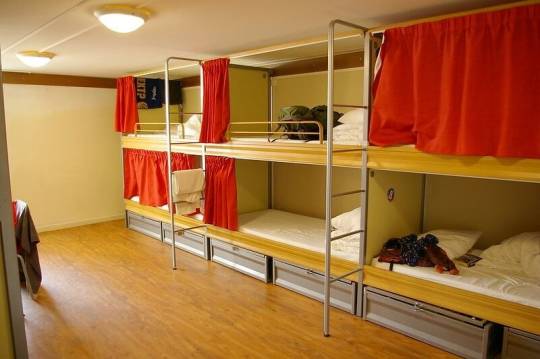
Traveling through Europe is like flipping through the pages of a vibrant history book while diving into a cultural melting pot. For us young professionals with the itch to explore but a keen eye on our bank accounts, the journey becomes not just about the places we see but also about smart traveling. Hostels, my friends, are the secret sauce to a fulfilling and budget-friendly European adventure. Let’s dive into how you can find hostels that are both easy on the wallet and pleasing to the eye (and soul).
Why Choose Hostels?
Hostels aren't just about saving a few bucks; they're about experiences. Imagine waking up in a 200-year-old building in Rome, having breakfast with new friends from three different countries, and swapping stories that add to your travel itinerary. Forget the myths about hostels being dingy or unsafe; today’s hostels often boast cleanliness, security, and even privacy with options for female-only dorms or private rooms.

The Stara Plana Hostel, Zakopane, Poland. Photo by Jordan Klein. Flickr.
Strategies for Finding Cheap and Beautiful Hostels
Utilize Trusted Hostel Booking Websites Start with the right tools. Websites like Hostelworld, and Booking.com, are your best friends here. They offer filters for everything under the sun—price, location, room type, and those all-important traveler reviews. Speaking from personal experience, don’t just glance at the ratings; dive into the reviews. I once found a hostel in Prague that looked average online but was praised for its welcoming staff and incredible local guides. It was one of my best stays. Book in Advance Planning ahead can snag you better deals and more options. Some apps and websites even offer alerts for price drops. I booked a stay in Barcelona four months ahead and saved almost 50% compared to last-minute prices. Prices have gone up post pandemic but off peak bargains and early booking can snap up great deals. Travel During Off-Peak Times Traveling in the shoulder season (spring and autumn) can cut your accommodation costs significantly. Plus, you get to enjoy Europe without the elbow-to-elbow tourist crowds. I visited Venice in late November, and the serene, misty canals felt like they belonged to me and a handful of locals.
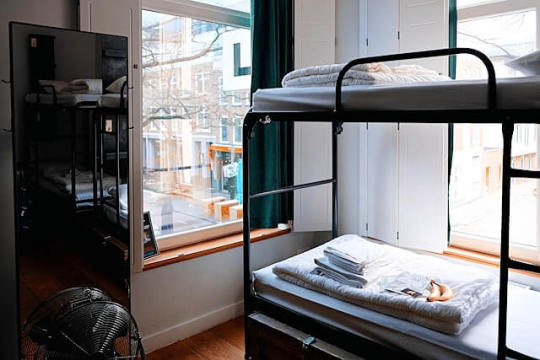
King Kong Hostel, Rotterdam, Netherlands. Photo by Marcus Loke. Unsplash. Consider Location Wisely A hostel right next to the Eiffel Tower or the Colosseum will cost a pretty penny. Sometimes, staying a bit further out can save you a lot, and with Europe’s efficient public transport, you’re never too far from the action. I stayed in a quaint hostel in the suburbs of Amsterdam and discovered my favorite café and bookshop that I would have missed otherwise. Look for Hostels with Amenities Free breakfast, communal kitchens, and social events can enrich your travel experience while saving money. I’ve made lifelong friends over free pancake mornings and city tours organized by hostels. Also, amenities like secure lockers and free Wi-Fi are non-negotiable for a comfortable stay. Think Mosquitoes! I have a phobia and don't mind admitting it. Mosquitoes are found in many European cities all year but are more active in late Spring through to the fall. If you have air conditioning then close the windows before dusk for that added safety, not forgetting to check your wardrobe, curtains and even under the bed. Most good hostels have nets on request. The city center in Venice is pretty safe. A boat trip to Lido, especially down in Alberoni, might have the charm, but let me tell you, the mosquitoes there are not just your average buzzers; they're more like feisty little warriors out for blood. Leverage Social Networks and Travel Forums Reddit and Facebook groups are goldmines for real-time recommendations. Before heading to Lisbon, I got a tip from a Facebook group about a newly opened hostel not yet listed on major booking sites. It was affordable, centrally located, and one of the best places I’ve stayed.
What to Look for in a Hostel
Safety, cleanliness, and vibe should top your list. A good hostel fosters a sense of community, making it easy to meet fellow travelers. Look for places with secure entry, individual lockers, and clean communal areas. Don’t underestimate the power of a good common room to make your stay memorable.
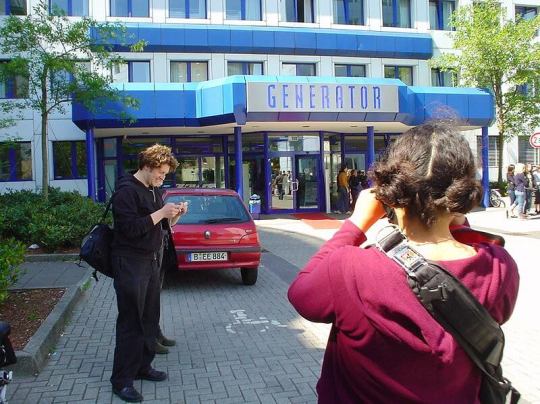
The Generator hostel in Berlin, Germany. Photo by Charles Hutchins. Flickr.
Making the Most of Your Hostel Stay
Dive into the social aspect of hostel life. Join in on movie nights, walking tours, or pub crawls. I met a group of fellow solo travelers on a hostel-organized boat tour in Budapest, and we ended up traveling together for the next two weeks. Remember to respect shared spaces and maintain good etiquette—your new friends will thank you.
Conclusion
Hostels are more than just a place to crash. They’re gateways to enriching experiences, new friendships, and insider knowledge of your destination. With a bit of planning, savvy booking strategies, and an open mind, you can uncover beautiful and affordable hostels across Europe that will become the backdrop to your adventure stories. So, dear fellow young professionals, it’s time to pack your bags (don’t forget a padlock and a quick-dry towel). Europe awaits with its open roads, historical marvels, and a hostel bed where your next adventure begins. Happy travels! This casual guide aims to equip you with the know-how to uncover those hostel gems that will make your European journey unforgettable. Remember, the best stories often come from the most unexpected places. Your dream hostel, with its blend of comfort, culture, and camaraderie, is out there waiting for you. Sources: THX News & Hostel World, Booking.com. Read the full article
#AffordableaccommodationEurope#BudgettravelEurope#Budget-friendlyhostels#CheaphostelsEurope#thxnews#Europeanadventure#Hostelbookingtips#Hostellife
0 notes
Text
Mpumalanga 7 Places To Discover The Best Of Nature
Mpumalanga: A Landscape of Wonder with Diverse Wildlife and Rich Culture
Mpumalanga: A Wilderness Wonderland with Diverse Wildlife and Rich Culture
Mpumalanga also known as the “Place of the Rising Sun,” is a province in northeastern South Africa that is known for its stunning natural beauty, diverse wildlife, and rich cultural heritage. The province is home to some of the country’s most popular tourist attractions, including Kruger National Park, the Blyde River Canyon, and the Panorama.
Natural beauty
Mpumalanga is a province of contrasts, with everything from lush forests and rolling hills to towering mountains and arid plains. The province is also home to a variety of waterfalls, including the Mac Mac Falls, Lisbon Falls, and Berlin Falls.
Diverse wildlife
Mpumalanga is home to a wide variety of wildlife, including lions, elephants, rhinos, leopards, and cheetahs. Visitors can go on game drives, bush walks, and self-drive safaris to see these animals in their natural habitat.
Rich cultural heritage
Mpumalanga is home to a number of cultural attractions, including the Pilgrim’s Rest gold mining town, the Sudwala Caves, and the Lowveld National Botanical Garden. Visitors can learn about the province’s rich history and culture at these attractions.
Places to visit in Mpumalanga..
Here are some of the best places to visit in Mpumalanga:
Kruger National Park:

The Panorama Route:
The Panorama Route is a scenic drive that takes visitors past some of Mpumalanga’s most popular tourist attractions, including the Blyde River Canyon, Bourke’s Luck Potholes, and God’s Window. The route also passes through several charming villages and towns, such as Graskop and Pilgrim’s Rest.God’s Window, Blyde River Canyon Nature Reserve, Drakensberg, Mpumalanga, South Africa

Blyde River Canyon Nature Reserve is the third largest canyon in the world and offers breathtaking views of the Blyde River and surrounding mountains. Visitors can go for hikes, visit viewpoints, and swim in the pools at the bottom of the canyon.
Game drive in Sabi Sand Private Game Reserve:

Sudwala Caves:
Sudwala Caves are a series of limestone caves that are over 200 million years old. Visitors can take guided tours of the caves and learn about their geological history and cultural significance.Sudwala Caves, Mpumalanga
Lowveld National Botanical Garden:
The Lowveld National Botanical Garden is home to a variety of indigenous plants, including cycads, orchids, and ferns. Visitors can stroll through the gardens and learn about the different species of plants that are found in Mpumalanga.Mbombela – Nelspruit: Lowveld National Botanical Garden – Crocodile River
Elephant Whispers elephant sanctuary:Elephant Whispers
Elephant Whispers is an elephant sanctuary that offers visitors the opportunity to interact with these gentle giants. Visitors can feed the elephants, walk with them in the bush, and learn about their behavior and conservation.
Tips for visiting Mpumalanga:
The best time to visit Mpumalanga is during the dry season, which runs from April to October. Mpumalanga is a relatively large province, so it is important to plan your trip in advance and decide which attractions you want to visit. If you are planning on going on a game drive, it is important to book your safari in advance. Mpumalanga is a relatively safe province to visit, but it is important to be aware of your surroundings and take precautions against petty crime.
Mpumalanga is a beautiful province with something to offer everyone. Whether you are interested in wildlife, nature, or culture, you are sure to find something to enjoy.
0 notes
Text
Private Guided Hike: Hidden Treasures of Sintra-Cascais Natural Park

Explore the beautiful location of Sintra-Cascais Natural Park in Lisbon. Cascais Routes provides a guided private hike to this Natural Park. The entire 2-hour tour can be customized according to your preferences. Explore the vastness that ranges from sand dunes to forests to rugged coastlines and beaches. A local guide accompanies you and your insurance and transportation are covered. Just bring in comfortable clothes, hiking shoes, sun protection, water, etc., and you are good to go. Discover the park’s hidden treasures on this unforgettable journey. Click here to learn more about the hiking tour at Sintra-Cascais Natural Park.
#Hiking in Cascais#outdoor adventure in cascais#Full Day Adventure in Cascais#custom adventure tour in cascais#Hiking in sintra
0 notes
Text
This guided tour takes you to the foundations of Roman Lisbon… and access is free🆓
The Open House Archeology of the Lisbon Museum - Roman Theater is back for a second edition, with more than twice as many places to visit as last year.
The Lisbon Museum – Roman Theater will once again “dig” into the depths of our beloved Lisbon, this time to take you, through guided tours, to 24 places where history was made, through the second edition of Open House Arqueologia.
After last year's huge success, on the 16th and 17th of September the Open House Archeology will take place again, with guided tours that will take you to see some of the most hidden places in the city, including four private houses, where several archaeological remains that are part of the history of the Portuguese capital.
instagram
0 notes